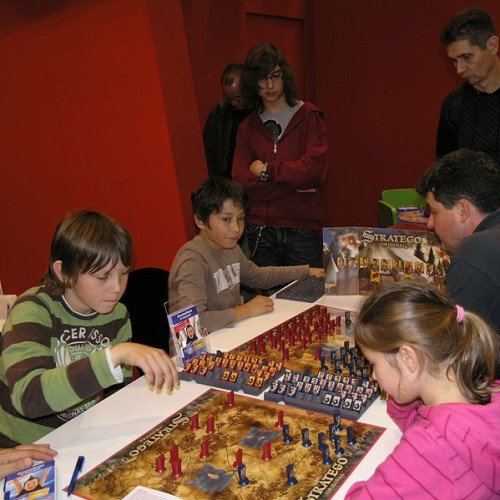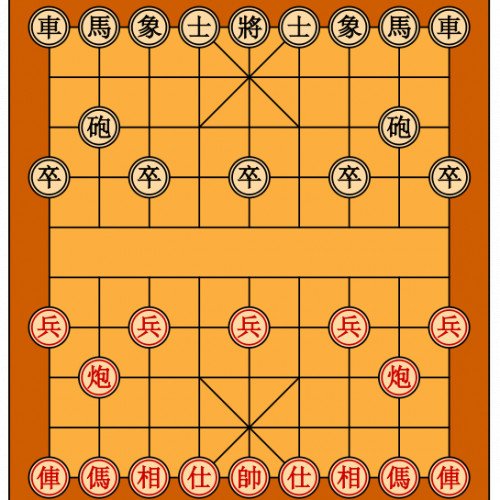STRATEGO VS XIANGQI

STRATEGO
Stratego is a strategy board game for two players on a board of 10×10 squares. Each player controls 40 pieces representing individual officer and soldier ranks in an army. The pieces have Napoleonic insignia. The objective of the game is to find and capture the opponent's Flag, or to capture so many enemy pieces that the opponent cannot make any further moves. Stratego has simple enough rules for young children to play but a depth of strategy that is also appealing to adults. The game is a slightly modified copy of an early 20th century French game named L'Attaque. It has been in production in Europe since World War II and the United States since 1961. There are now two- and four-handed versions, versions with 10, 30 or 40 pieces per player, and boards with smaller sizes (number of spaces). There are also variant pieces and different rulesets. The International Stratego Federation, the game's governing body, sponsors an annual Stratego World Championship. The name Stratego was first registered in 1942 in the Netherlands. The United States trademark was filed in 1958 and registered in 1960 to Jacques Johan Mogendorff and is presently owned by Jumbo Games as successors to Hausemann and Hotte, headquartered in the Netherlands. It has been licensed to manufacturers such as Milton Bradley, Hasbro and others, as well as retailers such as Barnes & Noble, Target stores, etc. The game box contents are a set of 40 gold-embossed red playing pieces, a set of 40 silver-embossed blue playing pieces, a glossy folding 15 1⁄2 in × 18 1⁄2 in (39 cm × 47 cm) rectangular cardboard playing board imprinted with a 10×10 grid of spaces, and instructions printed in English on the underside of the box top. The early sets featured painted wood pieces, later sets colored plastic. The pieces are small and roughly rectangular, 1 in (25 mm) tall and 3⁄4 in (19 mm) wide, and unweighted. More modern versions first introduced in Europe have cylindrical castle-shaped pieces. Some versions have a cardboard privacy screen to assist setup. A few versions have wooden boxes or boards.
Statistics for this Xoptio

XIANGQI
Xiangqi (Chinese: 象棋; pinyin: xiàngqí; Wade–Giles: Hsiang ch'i; English: /ˈʃɑːŋtʃi/), also called Chinese chess or Elephant chess, is a strategy board game for two players. It is one of the most popular board games in China, and is in the same family as Western chess, chaturanga, shogi, Indian chess and janggi. Besides China and areas with significant ethnic Chinese communities, xiangqi is also a popular pastime in Vietnam, where it is known as cờ tướng. The game represents a battle between two armies, with the object of capturing the enemy's general (king). Distinctive features of xiangqi include the cannon (pao), which must jump to capture; a rule prohibiting the generals from facing each other directly; areas on the board called the river and palace, which restrict the movement of some pieces (but enhance that of others); and placement of the pieces on the intersections of the board lines, rather than within the squares. Xiangqi is played on a board nine lines wide and ten lines long. As in the game Go (圍碁; or Wei ch'i 圍棋), the pieces are placed on the intersections, which are known as points. The vertical lines are known as files (Chinese: 路; pinyin: lù; "road"), and the horizontal lines are known as ranks (Chinese: 線/綫; pinyin: xiàn; "line"). Centred at the first to third and eighth to tenth ranks of the board are two zones, each three points by three points, demarcated by two diagonal lines connecting opposite corners and intersecting at the centre point. Each of these areas is known as 宮 About this soundgōng, a castle. Dividing the two opposing sides, between the fifth and sixth ranks, is 河 hé, the "river". The river is often marked with the phrases 楚河 About this soundchǔ hé, meaning "River of the Chu ", and 漢界 About this soundhàn jiè, meaning "Border of the Han", a reference to the Chu–Han War. Although the river (or Hanchu boundary) provides a visual division between the two sides, only two pieces are affected by its presence: soldiers have an enhanced move after crossing the river, and elephants cannot cross it. The starting points of the soldiers and cannons are usually, but not always, marked with small crosses.